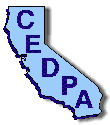
 |
California Educational Data Processing Association |
The DataBus - Vol. 37, No. 1
|
To those of us principals and superintendents involved with the new technologies in education, it's clearer than ever that they are challenging us to change our approach in schools. As one of the first district technology coordinators in the nationŠin the Capistrano Unified School District in the early 1980s--I was lucky enough to glimpse what the future would be in our classrooms--a future that is now upon us.
A change of immense proporations.
Back then, technology was seen as an enriching addition to our rigorous curriculum; it did not seriously challenge us to rethink and retool our delivery system. We never questioned our primary purpose--to teach the same three R's that have been our focus since the days of the one-room schoolhouse. However, today's marketplace demands that we add a fourth R if we are to prepare our students for the world of work and study--the R for research. It's all because of the internet. Our students have the capacity to become experts on any topic, simply because they now hold the key to infinite stores of knowledge and all the resources one can imagine. Our dreams of "classrooms without walls" and online access to the libraries, museums, and think tanks of the world are now attainable.
Today we face the imperative of giving students the skills to effectively navigate their way through the vast resources on the Internet (see box, below). Those ten basic skills and abilities are essential to this fourth R.
All of this involves a very different way of thinking about teaching. Our classrooms need to become research laboratories. Most traditional lessons would then be beginning points, not ends in themselves.
As students pursue discoveries using online resources, we must teach them to think critically. They must learn how to recognize bias, propaganda, and commercially driven information, to think both concretely and abstractly, to reason and to question.
Taking the lead.
To meet the challenge of the fourth R, superintendents and principals must initiate a monumental shift in perception by educating and persuading school boards, fellow administrators, and teachers. We must convince all that making meaning out of the vast amount of information available to our students is a challenge that must be met and that research skills are basic to a sound education in the 21st century.
Let's start with our staffs. We need to form "think tanks" of teachers and others to discuss how to integrate online research skills into classroom activities and then how to make a shift in practice to become motivators and facilitators.
We must present our case to our school boards and secure the support to focus on this new discipline. We need to convince the community that research skills must be included in performance standards for students. The ability to obtain, organize, and evaluate information is a skill students will use their entire lifetime--it really is the fourth R.
This article originally appeared in the October, 1996, issue of Electronic Learning and appears here by permission of the author.